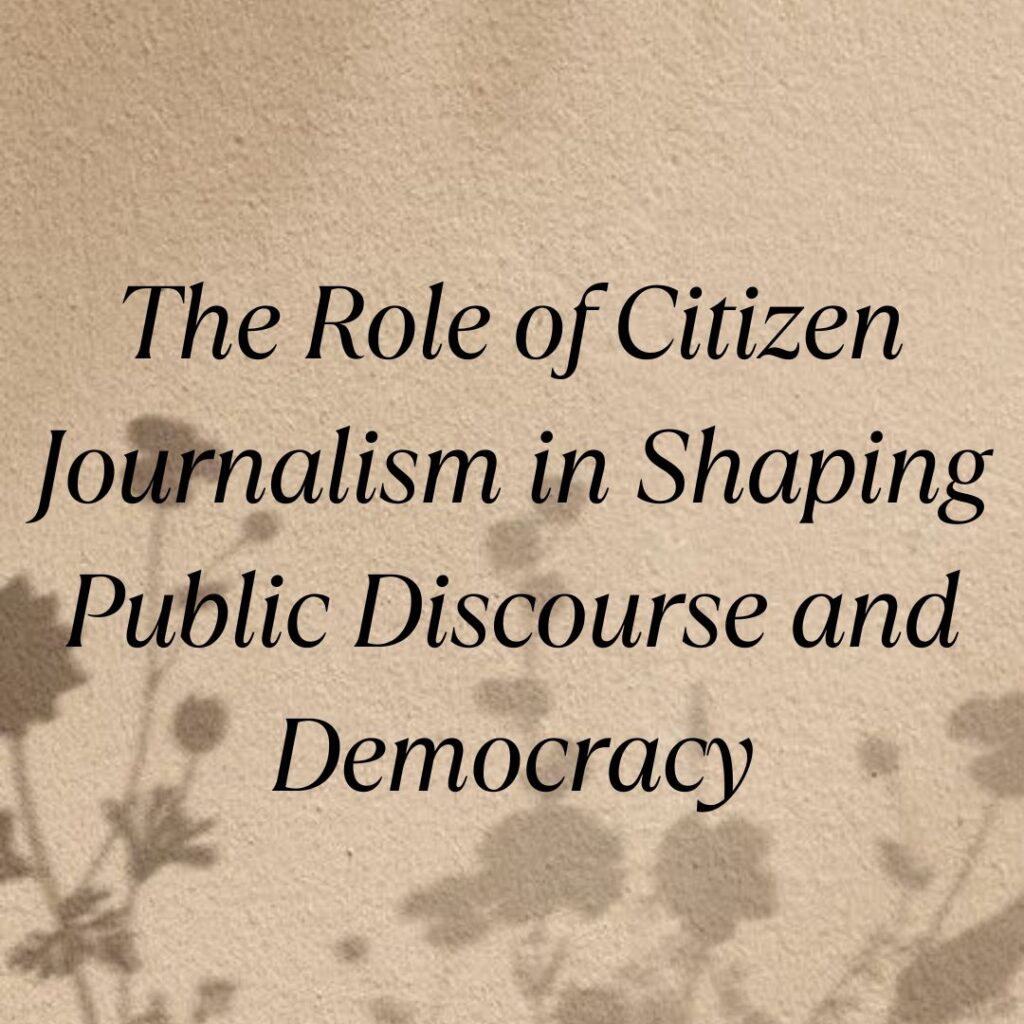In an era where information flows freely and the voice of the individual carries unprecedented weight, citizen journalism stands as a powerful force in shaping public discourse and democracy. No longer confined to traditional media channels, everyday people armed with smartphones and internet access are becoming the eyes, ears, and voices of their communities. This phenomenon marks a paradigm shift where the monopoly on news reporting held by established media outlets is being challenged by the raw, unfiltered narratives of citizen journalists.
What is Citizen Journalism?
Citizen journalism can be defined as the act of ordinary individuals, without formal journalism training, engaging in the collection, analysis, and dissemination of news and information. This can range from eyewitness accounts of breaking news events to in-depth investigations into local issues that may otherwise go unnoticed by mainstream media.
Empowering the Individual Voice
One of the most profound impacts of citizen journalism lies in its ability to amplify diverse voices and perspectives. Unlike traditional media, which may be constrained by editorial policies or commercial interests, citizen journalists often report from a personal or community-driven perspective. This grassroots approach not only provides a more nuanced view of events but also helps to fill gaps in coverage that traditional media may overlook.
Take, for instance, the role of citizen journalists during the Arab Spring uprisings of 2010-2011. In countries like Egypt and Tunisia, ordinary citizens used social media platforms to document protests, share images and videos of government crackdowns, and provide real-time updates on developments. These citizen journalists became crucial in circumventing state censorship and offering the world a raw, unfiltered view of the events unfolding on the ground.
Bridging the Gap: Local News Coverage
In an age where many traditional newsrooms are facing budget cuts and downsizing, citizen journalists are increasingly filling the void in local news coverage. From reporting on city council meetings to investigating environmental concerns in their neighborhoods, citizen journalists play a vital role in keeping communities informed and engaged.
For example, in the aftermath of Hurricane Katrina in 2005, citizen journalists used online platforms to report on the devastation and its impact on local communities long before traditional media could mobilize their resources. These grassroots efforts not only provided critical information to residents but also helped to galvanize support and relief efforts from across the country.
Holding Power Accountable
Perhaps one of the most significant contributions of citizen journalism is its role in holding power accountable. By bypassing traditional gatekeepers, citizen journalists can shine a light on issues that may be ignored or downplayed by mainstream media. Whether exposing corruption at the local level or documenting human rights abuses, citizen journalists act as watchdogs, demanding transparency and accountability from those in positions of authority.
The case of Edward Snowden and the revelations about mass surveillance by the NSA underscored the pivotal role of citizen journalists in exposing government overreach. Through leaks to journalists like Glenn Greenwald and Laura Poitras, Snowden’s actions sparked a global debate on privacy rights and government surveillance practices. This example illustrates how individual whistleblowers, supported by citizen journalists, can catalyze seismic shifts in public policy and discourse.
Challenges and Ethical Considerations
Despite its many strengths, citizen journalism is not without its challenges and ethical considerations. The lack of formal training can sometimes lead to inaccuracies or bias in reporting. Additionally, the rise of fake news and misinformation poses a significant threat to the credibility of citizen journalism as a whole.
Platforms like Facebook and Twitter have become battlegrounds for the dissemination of false information, often amplified by algorithms designed to maximize engagement. This underscores the importance of critical media literacy skills and responsible reporting practices among citizen journalists.
Conclusion: The Future of Citizen Journalism
As we look to the future, the role of citizen journalism in shaping public discourse and democracy will continue to evolve. Technological advancements, including artificial intelligence and blockchain technology, hold the potential to enhance the credibility and reach of citizen journalism while addressing some of its inherent challenges.
Ultimately, citizen journalism serves as a powerful reminder of the transformative impact of individual voices in a democratic society. By amplifying diverse perspectives, holding power accountable, and filling gaps in coverage, citizen journalists play a vital role in shaping our understanding of the world around us.
In an age where information is abundant yet often fragmented, citizen journalism stands as a beacon of hope for an informed and engaged citizenry. By harnessing the power of technology and embracing principles of transparency and accountability, citizen journalists can continue to drive positive change and contribute to a more vibrant and inclusive public discourse.
So, the next time you scroll through your social media feed or stumble upon a blog post from an ordinary citizen, remember that you are witnessing more than just a personal story—you are experiencing democracy in action.
Let’s continue to support and celebrate the voices of citizen journalists as they navigate the complex landscape of our interconnected world, one story at a time. After all, the future of democracy depends on an informed and engaged citizenry, and citizen journalism is paving the way forward.






